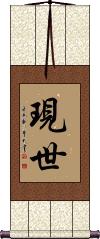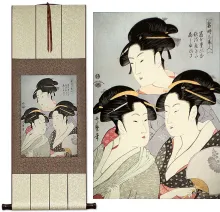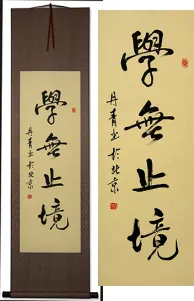Many custom options...
And formats...

Live for the Day in Chinese / Japanese...
Buy a Live for the Day calligraphy wall scroll here!
Personalize your custom “Live for the Day” project by clicking the button next to your favorite “Live for the Day” title below...
Live For The Day
活在今天 is not an eastern concept, so it does not translate into a phrase that seems natural on a wall scroll.
However, if this is your philosophy, the characters shown here do capture your idea of living for today or living in the moment. 活在今天 says “Live in today,” and they are grammatically correct in Chinese.
Note: This kind of makes sense in Korean Hanja but the grammar is Chinese, so it’s not that natural in Korean.
Live In The Moment / Live In The Now
現世 is a very short way to write “live in the moment” or “live in the now” in Japanese.
This short word is open to interpretation. It's used in Japanese Buddhism to mean “the current epoch” or “the current age” (the current age is but a brief moment in the greater scope of existence). In that context, this is pronounced “utsushiyo” or “ustusiyo” in Japanese. Otherwise, it's pronounced “gensei” in Japanese.
Other translation possibilities include:
Earthly world
This world
This life
Present life
Present generation
Present incarnation
This existence
This (momentary) reality
Note: This is also a word in Chinese and old Korean Hanja. While the meaning is more or less the same, this is not recommended for a wall scroll if your audience is Chinese or Korean. This selection is best if your audience is Japanese.
Live For The Day / Seize The Day
今を生きる is a Japanese phrase that can be translated as “live for the day,” “live for the moment,” “seize the day,” or “make the most of the present.”
You can think of this as the Japanese version of “Carpe Diem.”
Note: Because this selection contains some special Japanese Hiragana characters, it should be written by a Japanese calligrapher.
Carpe Diem / Seize the Day
This in-stock artwork might be what you are looking for, and ships right away...
Gallery Price: $108.00
Your Price: $59.88
Gallery Price: $61.00
Your Price: $33.88
Gallery Price: $31.00
Your Price: $16.88
Gallery Price: $200.00
Your Price: $122.88
Not the results for live for the day that you were looking for?
Below are some entries from our dictionary that may match your live for the day search...
| Characters If shown, 2nd row is Simp. Chinese |
Pronunciation Romanization |
Simple Dictionary Definition |
今を生きる see styles |
imaoikiru いまをいきる |
More info & calligraphy: Live For The Day / Seize The Day |
五法 see styles |
wǔ fǎ wu3 fa3 wu fa gohō |
pañcadharma. The five laws or categories, of which four groups are as follows: I. 相名五法 The five categories of form and name: (1) 相 appearances, or phenomena; (2) 名 their names; (3) 分別 sometimes called 妄想 ordinary mental discrimination of them— (1) and (2) are objective, (3) subjective; (4) 正智 corrective wisdom, which corrects the deficiencies and errors of the last: (5) 如如 the 眞如 Bhutatathata or absolute wisdom, reached through the 如理智 understanding of the law of the absolute, or ultimate truth. II. 事理五法 The five categories into which things and their principles are divided: (1) 心法 mind; (2) 心所法 mental conditions or activities; (3) 色法 the actual states or categories as conceived; (4) 不相應法 hypothetic categories, 唯識 has twenty-four, the Abhidharma fourteen; (5) 無爲法 the state of rest, or the inactive principle pervading all things; the first four are the 事 and the last the 理. III. 理智五法 cf. 五智; the five categories of essential wisdom: (1) 眞如 the absolute; (2) 大圓鏡智 wisdom as the great perfect mirror reflecting all things; (3) 平等性智 wisdom of the equal Buddha nature of all beings; (4) 妙觀察智 wisdom of mystic insight into all things and removal of ignorance and doubt; (5) 成所作智 wisdom perfect in action and bringing blessing to self and others. IV. 提婆五法 The five obnoxious rules of Devadatta: not to take milk in any form, nor meat, nor salt; to wear unshaped garments, and to live apart. Another set is: to wear cast-off rags, beg food, have only one set meal a day, dwell in the open, and abstain from all kinds of flesh, milk, etc. |
十二 see styles |
shí èr shi2 er4 shih erh tooji とおじ |
twelve; 12 12; twelve; (given name) Tooji dvātriṃśa. Thirty-two. 三十二應 (or 三十二身) The thirty-two forms of Guanyin, and of Puxian, ranging from that of a Buddha to that of a man, a maid, a rakṣas; similar to the thirty-three forms named in the Lotus Sūtra. 三十二相三十二大人相 dvātriṃśadvaralakṣaṇa. The thirty-two lakṣaṇas, or physical marks of a cakravartī, or 'wheel-king', especially of the Buddha, i. e. level feet, thousand-spoke wheel-sign on feet, long slender fingers, pliant hands and feet, toes and fingers finely webbed, full-sized heels, arched insteps, thighs like a royal stag, hands reaching below the knees well-retracted male organ, height and stretch of arms equal, every hair-root dark coloured, body hair graceful and curly, golden-hued body, a 10 ft. halo around him, soft smooth skin, the 七處, i. e. two soles, two palms, two shoulders, and crown well rounded, below the armpits well-filled, lion-shaped body, erect, full shoulders, forty teeth, teeth white even and close, the four canine teeth pure white, lion-jawed, saliva improving the taste of all food, tongue long and broad, voice deep and resonant, eyes deep blue, eyelashes like a royal bull, a white ūrnā or curl between the eyebrows emitting light, an uṣṇīṣa or fleshy protuberance on the crown. These are from the 三藏法數 48, with which the 智度論 4, 涅盤經 28, 中阿含經, 三十ニ相經 generally agree. The 無量義經 has a different list. 三十二相經 The eleventh chapter of the 阿含經. 三十二相經願 The twenty-first of Amitābha's vows, v. 無量壽經. 三十三 trayastriṃśat. Thirty-three. 三十三天忉利天; 憺梨天, 多羅夜登陵舍; 憺利夜登陵奢; 憺利耶憺利奢 Trayastriṃśas. The Indra heaven, the second of the six heavens of form. Its capital is situated on the summit of Mt. Sumeru, where Indra rules over his thirty-two devas, who reside on thirty-two peaks of Sumeru, eight in each of the four directons. Indra's capital is called 殊勝 Sudarśana, 喜見城 Joy-view city. Its people are a yojana in height, each one's clothing weighs 六鐵 (1; 4 oz. ), and they live 1, 000 years, a day and night being equal to 100 earthly years. Eitel says Indra's heaven 'tallies in all its details with the Svarga of Brahminic mythology' and suggests that 'the whole myth may have an astronomical meaning', or be connected, with 'the atmosphere with its phenomena, which strengthens Koeppen's hypothesis explaining the number thirty-three as referring to the eight Vasus, eleven Rudras, twelve Ādityas, and two Aśvins of Vedic mythology'. In his palace called Vaijayanta 'Indra is enthroned with 1, 000 eyes with four arms grasping the vajra. There he revels in numberless sensual pleasures together with his wife Śacī... and with 119, 000 concubines with whom he associates by means of transformation'.; dvādaśa, twelve. |
安居 see styles |
ān jū an1 ju1 an chü ango あんご |
to settle down; to live peacefully (n,vs,vi) {Buddh} varsika (meditation retreat; usu. for 90 days starting on the 15th day of the 4th month of the lunisolar calendar); (given name) Yasuoki Tranquil dwelling. varṣā, varṣās, or varṣāvasāna. A retreat during the three months of the Indian rainy season, and also, say some, in the depth of winter. During the rains it was 'difficult to move without injuring insect life'. But the object was for study and meditation. In Tokhara the retreat is said to have been in winter, from the middle of the 12th to the middle of the 3rd moon; in India from the middle of the 5th to the 8th, or the 6th to the 9th moons; usually from Śrāvaṇa, Chinese 5th moon, to Aśvayuja, Chinese 8th moon; but the 16th of the 4th to the 15th of the 7th moon has been the common period in China and Japan. The two annual periods are sometimes called 坐 夏 and 坐 臘 sitting or resting for the summer and for the end of the year. The period is divided into three sections, former, middle, and latter, each of a month. |
十二法人 see styles |
shí èr fǎ rén shi2 er4 fa3 ren2 shih erh fa jen jūnihōnin |
Those who follow the twelve practices of the ascetics: (1) live in a hermitage; (2) always beg for food; (3) take turns at begging food; (4) one meal a day; (5) reduce amount of food; (6) do not take a drink made of fruit or honey after midday; (7) wear dust-heap garments; (8) wear only the three clerical garments; (9) dwell among graves; (10) stay under a tree; (11) on the dewy ground; (12) sit and never lie. |
負けるが勝ち see styles |
makerugakachi まけるがかち |
(expression) (proverb) he that fights and runs away may live to fight another day; sometimes you have to lose to win; losing is winning |
逃げるが勝ち see styles |
nigerugakachi にげるがかち |
(expression) (proverb) he that fights and runs away may live to fight another day; discretion is the better part of valor; fleeing is winning |
今朝有酒今朝醉 see styles |
jīn zhāo yǒu jiǔ jīn zhāo zuì jin1 zhao1 you3 jiu3 jin1 zhao1 zui4 chin chao yu chiu chin chao tsui |
to live in the moment (idiom); to live every day as if it were one's last; to enjoy while one can |
Variations: |
kurasu くらす |
(v5s,vi) (1) to live (on, by, etc.); to lead a life; to get along; to get by; (v5s,vi) (2) to make a living; to earn a livelihood; (v5s,vt,vi) (3) (dated) to spend one's time (doing); to pass one's days (doing); to live; to get on (doing); (suf,v5s) (4) (after the -masu stem of a verb) to do daily; to do all day long; to continue doing |
Variations: |
nakikurasu なきくらす |
(v5s,vt,vi) to spend one's days in tears; to weep day and night; to live in sorrow |
The following table may be helpful for those studying Chinese or Japanese...
| Title | Characters | Romaji (Romanized Japanese) | Various forms of Romanized Chinese | |
| Live For The Day | 活在今天 | huó zài jīn tiān huo2 zai4 jin1 tian1 huo zai jin tian huozaijintian | huo tsai chin t`ien huotsaichintien huo tsai chin tien |
|
| Live In The Moment Live In The Now | 現世 现世 | gen sei / gensei | xiàn shì / xian4 shi4 / xian shi / xianshi | hsien shih / hsienshih |
| Live For The Day Seize The Day | 今を生きる | ima wo i ki ru imawoikiru | ||
| Carpe Diem Seize the Day | 把握今日 | bǎ wò jīn rì ba3 wo4 jin1 ri4 ba wo jin ri bawojinri | pa wo chin jih pawochinjih |
|
| In some entries above you will see that characters have different versions above and below a line. In these cases, the characters above the line are Traditional Chinese, while the ones below are Simplified Chinese. | ||||
Successful Chinese Character and Japanese Kanji calligraphy searches within the last few hours...















